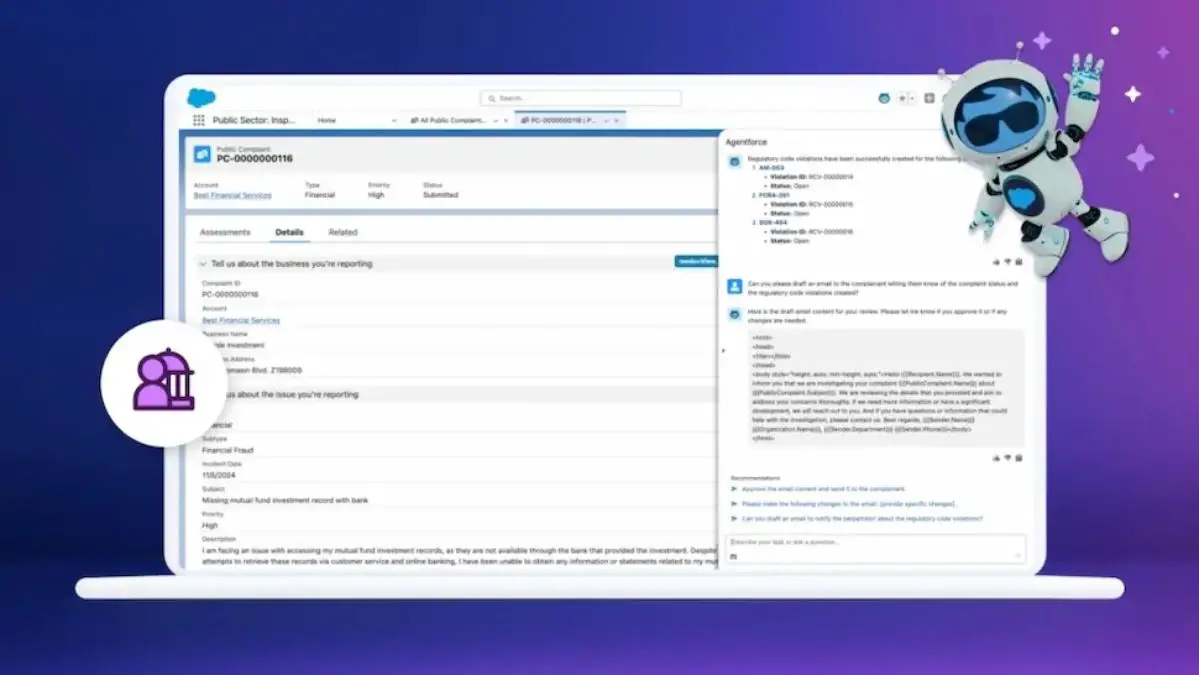Salesforce has unveiled Agentforce for Public Sector, a new AI-powered platform designed to transform how government agencies operate. Built on agentic AI technology, the platform introduces virtual agents capable of streamlining workflows, boosting efficiency, and improving citizen engagement.
The launch marks a significant milestone as Agentforce has already achieved FedRAMP High authorization, ensuring compliance with the most stringent U.S. government security standards. Hosted on AWS infrastructure, the platform offers agencies both scalability and security, two critical requirements for public sector adoption.
Why Salesforce Brought Agentforce to the Public Sector
Government bodies around the world face mounting challenges: staffing shortages, rising citizen expectations, and complex compliance requirements. Salesforce highlighted these issues as primary motivators behind Agentforce’s development.
The company’s Global AI Readiness Index revealed that nearly 90% of citizens are open to engaging with AI-driven government services. Yet, privacy and security concerns have slowed down adoption in the sector. By receiving FedRAMP High clearance, Agentforce addresses these concerns head-on, providing a trustworthy foundation for AI integration in public services.
Early Adoption: City of Kyle, Texas
One of the first adopters is the City of Kyle, Texas. According to Assistant City Manager Jesse Elizondo, “It’s like having every aspect of town hall instantly accessible 24/7, whether you’re a city employee or a resident seeking help.”
This demonstrates Agentforce’s potential to make government services more responsive, accessible, and citizen-focused.
Core Features of Agentforce for Public Sector
Salesforce has introduced three initial feature sets tailored to public sector needs:
- Compliance Management – AI agents assist compliance officers by analyzing violations, calculating fees, and ensuring regulatory adherence.
- Complaint Management – The system summarizes constituent complaints, identifies patterns, and provides actionable insights for faster response.
- Recruitment Management – AI agents screen applications, match candidates to roles, and speed up the hiring process in agencies facing staffing shortages.
Upcoming Features: October 2025 Rollout
Salesforce confirmed that by October 2025, additional AI-powered tools will be introduced, including:
- Job Recommendation Bots – Helping applicants find suitable roles in government agencies.
- Benefit Application Agents – Guiding citizens through tax, welfare, and benefit application processes.
- Complaint Filing Assistants – Allowing citizens to log and track complaints seamlessly.
These bots aim to deliver 24/7 accessibility to essential services while reducing the administrative burden on human staff.
Security and Trust at the Core
Given the sensitive nature of government data, Salesforce emphasized that Agentforce for Public Sector runs entirely on AWS infrastructure designed to meet global high-security requirements. This ensures the platform is resilient, compliant, and capable of handling high-sensitivity workloads across agencies.
The Bigger Picture: AI Agents Supporting Human Workers
Salesforce EVP and GM of Public Sector, Nasi Jazayeri, explained:
“With AI agents working alongside dedicated government workers and providing 24/7 support for constituents – helping with everything from routine inquiries to complex, time-consuming tasks – Agentforce will power a more responsive, agile, and effective government.”
By combining AI with human oversight, Salesforce positions Agentforce as a tool to augment—not replace—public servants, helping governments deliver better outcomes at scale.
Conclusion
With Agentforce for Public Sector, Salesforce is bringing secure, FedRAMP-authorized AI into the heart of government operations. By tackling staffing shortages, improving compliance management, and enhancing citizen services, the platform represents a pivotal step toward modern, AI-enabled governance.
As governments continue to face heightened expectations and regulatory challenges, platforms like Agentforce could redefine how citizens interact with public services in the years ahead.

